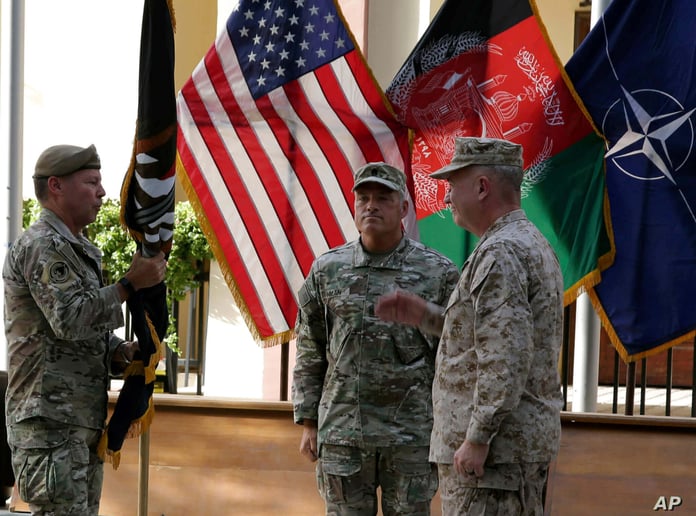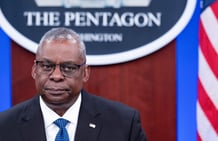
“Let me ask those who want us to stay in Afghanistan: Are you prepared to put thousands more of our American daughters and sons at risk?”
With this question, US President Joe Biden addressed those who want the continued US military presence in Afghanistan. Was Biden’s decision to withdraw right? And what are its repercussions?
A debate on the Decision Capital program bore these and other questions to Jonathan Schroeder, the American expert on Afghan affairs, and to retired US Army Colonel David de Roche, who is currently a professor at the National Defense University in Washington. In part of the episode, the expert on Islamic movements, Camille Al-Taweel, author of the book “Al-Qaeda and its Sisters”, also participated from London.
Jonathan Schroeder supports Biden’s decision, because the US military presence has become the “engine of the conflict” in Afghanistan, this long conflict, which no one has been able to resolve militarily. Therefore, the only way to resolve, according to Schroeder, is the US military withdrawal from Afghanistan .
On the other hand, Colonel David de Roche considers that the withdrawal took place in a “wrong way”, because America “first negotiates an agreement and then withdraws militarily, and what happened is the opposite, and this “gives the enemy everything” in the opinion of de Roche, who served in Afghanistan.
The withdrawal is a “disturbing signal” for Democratic Senator Jane Shaheen, who is demanding that the United States have a “clear plan to ensure the security of Afghan civilians and hold the Taliban accountable.” While Republican Senator Joni Earnest believes that Biden’s announcement of an “early withdrawal” from Afghanistan strengthens the Taliban and its allies. Therefore, Ernst will introduce the “Prevent Terrorism from the Streets of America” bill; This bill would require “our military and intelligence, and the Department of Homeland Security, to carefully assess the growing danger that a precipitous withdrawal from Afghanistan poses to our soil,” as she put it.
For its part, the newspaper “Washington Post ” called on President Biden “to reconsider the decision to withdraw quickly from Afghanistan, because the collapse of the government in Kabul will have major repercussions,” in the opinion of the editorial post. While Gerald Seib believes, in the “Wall Street Journal”, that America was persuaded by the idea that “a military victory in Afghanistan cannot be achieved,” but he warns the Americans that just as “going to Afghanistan had a cost, so would the withdrawal” from it.
The writer Camille Al-Taweel says that the withdrawal has benefits for America and losses as well. It is pulling Washington out of the Afghan quagmire, which has consumed many of its human and material capabilities. But the withdrawal will greatly damage the image of America, which will join the list of the empires that were defeated in Afghanistan,
Al-Taweel refers the judgment on Biden’s decision to the coming days, which will show the rightness or wrongness of the decision. In this context, it is worth considering the opinion of Bill Kristol, the former chief of staff of the US Vice President during the US invasion of Afghanistan. Kristol says Biden’s withdrawal from Afghanistan is an “unintended mistake, and it would have very bad repercussions.”
China, Russia and Iran face the Afghan challenges
Charles Lister, of the Middle East Institute in Washington, says that the fall of northern Afghanistan to the Taliban constitutes a nightmare for China, especially since it is reported that the Turkistan Islamic Party led by Haji Furqan played a major role in the Afghan province of Badakhshan (near China).
But Jonathan Schroeder does not agree with the description of the “nightmare”, because China has “relations with the Taliban”, and can express to the Taliban its concern if there is any armed presence of the Uyghurs there. While de Roche believes that “the potential threat of the Taliban will worry China.”
For his part, Al-Taweel says that the Taliban “made pledges” to all neighboring countries not to harm them from Afghanistan. Will the Taliban keep their promises? Al-Taweel believes that, especially that there is currently an “ambiguous relationship” between the Taliban and Al-Qaeda, and that the Taliban “should not repeat the experience of the 1990s,” in his opinion.
State Department spokesman Ned Price stresses that Afghanistan’s neighbors have a stake in the country’s future. They must use their influence “positively and constructively”, in a way that promotes peace and supports the Afghan people.
To Uzbekistan and Tajikistan?
Pentagon spokesman John Kirby says that the goal of the United States after withdrawing from Afghanistan is to “maintain remote counter-terrorism capabilities to prevent Afghanistan from being turned into a safe haven for terrorist attacks” against US soil.
In the context of Washington’s focus on this point, de Roche believes, there will be an American military presence in Uzbekistan and perhaps in Tajikistan. In addition to the “non-strategic and discreet presence” in Pakistan. While Schroeder confirms that the Biden administration is talking with Uzbekistan and Tajikistan to find out what can be done there, Schroeder adds that “Russian influence in these two countries” poses a challenge to America, which, in his opinion, must rely on “Afghan special forces” and its large military assets. and relatively far away, to prevent the Taliban from taking control of Afghanistan.
Afghanistan after the US withdrawal: settlement or war?
The great nightmare that Schroeder predicts is an Afghan “civil war”. De Roach agrees with this characterization, predicting that Afghanistan will “sink” into chaos, and that Biden will pay the price for his decision in the upcoming elections, according to de Roach. Al-Taweel expects Afghanistan to be headed toward a “protracted civil war,” and the Taliban movement, which is largely dominated by Pashtuns, will engage in long and bloody ethnic and civil conflicts.
In addition, US President Joe Biden believes that the only way through which peace will be achieved in Afghanistan is to reach a “temporary settlement with the Taliban, and they decide how peace can be established” with them.
For two decades, the United States has contributed to training and equipping Afghan security forces and laying the foundations for a civilian, democratic government that respects human rights, especially the rights of Afghan women. It remains that the path of internal peace needs Afghan leadership, consensus and commitment to achieve long-term peace in the country.












